
Legal Landmines Avoiding Common Property Management Pitfalls
Managing property can feel like a juggling act. From handling tenants to maintaining compliance with regulations, there are countless responsibilities to keep in check. Even the most experienced property managers can encounter legal issues if they’re not careful. Whether you’re a landlord or a property manager, these tips will keep you informed and prepared.
Clear Lease Agreements That Protect Both Tenants and Owners
A clear lease agreement is your first line of defense in property management. A well-drafted lease not only outlines the rules but also sets expectations for both parties. It should cover rent terms, payment schedules, maintenance responsibilities, and rules for property use. When leases are vague or incomplete, misunderstandings arise, often leading to disputes. A strong, transparent agreement helps you avoid these issues and ensures both you and your tenants are protected.
Additionally, customizing leases for specific properties can make a big difference. For instance, a multi-family property might require stricter noise policies, while single-family homes may need clauses about lawn care. Tailoring the agreement to the situation shows professionalism and reduces the chances of legal complications. Always consult an expert to ensure your leases comply with local laws and accurately address the unique needs of your property.

Proper Handling of Security Deposits to Avoid Disputes
Security deposits are a frequent source of conflict between landlords and tenants. Mishandling deposits—whether by failing to return them on time or making improper deductions—can lead to legal trouble. To avoid disputes, keep a clear record of the deposit amount, provide a detailed receipt, and use a separate account for holding deposits. Transparency in this process shows your tenants you’re operating in good faith.
When it’s time for move-out, conducting a joint inspection with the tenant can prevent surprises. Clearly document any damages and provide itemized statements for deductions. Many disputes arise when tenants feel blindsided by unexpected charges. Open communication and documentation go a long way in keeping the relationship amicable and staying on the right side of the law.
Staying Compliant with Local Housing Regulations and Codes
Housing regulations and building codes vary by location, and staying compliant is crucial to avoid hefty fines or lawsuits. These laws often cover health and safety standards, zoning requirements, and accessibility rules. Ignorance of the law isn’t an excuse, so staying informed about your local regulations is non-negotiable. Regular audits and consultations with legal professionals can help you remain compliant.
Beyond basic compliance, it’s worth keeping an eye on changes to local laws. For example, rent control measures or eviction moratoriums might affect how you manage your properties. Adapting quickly to these changes not only protects you legally but also demonstrates your commitment to ethical property management.
Fair Eviction Processes That Follow the Law
Evictions are stressful for everyone involved, but following the law can make the process smoother. Many landlords make the mistake of skipping formal eviction procedures, such as providing proper notice or filing court paperwork. This can result in legal penalties and prolong the issue. Always follow the legal eviction process, even when the situation feels urgent.
It’s also worth exploring alternatives before jumping straight to eviction. Payment plans or mediation services can sometimes resolve issues without needing to remove a tenant. When eviction is unavoidable, treat tenants respectfully and keep thorough records of the process. Handling these situations with care minimizes conflict and protects you from legal repercussions.
Transparent Communication to Prevent Misunderstandings
Clear communication is the cornerstone of successful property management. Misunderstandings often escalate into legal disputes, so keeping tenants informed is essential. Whether it’s about maintenance schedules, policy changes, or rent increases, deliver information promptly and clearly. Use multiple communication channels, like emails and posted notices, to ensure tenants receive important updates.
Encourage tenants to ask questions or voice concerns when they arise. Creating an open line of communication builds trust and reduces the likelihood of minor issues snowballing into bigger problems. Transparency not only helps you avoid legal trouble but also fosters a more positive relationship with your tenants.
Regular Property Maintenance to Avoid Liability Issues
Maintaining your property isn’t just about aesthetics—it’s about safety and liability. Failing to address hazards like loose railings or faulty wiring can result in tenant injuries, leaving you open to lawsuits. Conduct regular inspections and promptly address any maintenance requests to keep the property safe and functional.
Preventive maintenance is equally important. Regularly servicing HVAC systems, checking for leaks, and ensuring smoke detectors work can save you money in the long run while reducing legal risks. Tenants will appreciate your proactive approach, and you’ll have peace of mind knowing your property meets safety standards.
Accurate Record-Keeping for Leases and Payments
Accurate record-keeping is a behind-the-scenes task that can save you major headaches. Keeping track of leases, payment receipts, and maintenance logs ensures you’re prepared if any disputes arise. For instance, if a tenant claims they paid rent that you never received, having a detailed record will help resolve the issue quickly.
In addition to helping with disputes, good record-keeping ensures you’re ready for tax season. Proper documentation of expenses and income makes filing taxes easier and reduces the risk of audits. Investing in property management services can streamline this process, keeping your records organized and accessible.
Screening Tenants Carefully to Minimize Future Risks
The tenant screening process is your first opportunity to prevent future problems. A thorough screening process, including credit checks, rental history, and employment verification, helps you identify reliable tenants. Skipping this step can result in costly evictions or property damage down the line.
It’s important to stay consistent and fair during screening to avoid discrimination claims. Following Fair Housing Act guidelines ensures you treat all applicants equally while choosing the best fit for your property. A little extra effort upfront saves you from significant headaches later, making tenant screening an essential part of property management.
Avoid Common Property Management Pitfalls with Pacific West Property Management: Your Trusted Partner for Stress-Free Property Management
Managing properties can feel overwhelming, especially when faced with legal hurdles and tenant concerns. At Pacific West Property Management, we understand the challenges that landlords and property owners face. From drafting clear lease agreements to ensuring compliance with local regulations, our experienced team handles the details so you can focus on what matters most. We’re committed to proactive communication, thorough tenant screening, and meticulous property maintenance to keep your investments running smoothly.
Don’t let legal landmines or property management headaches weigh you down. Let Pacific West Property Management be your guide to stress-free property ownership. Contact us today and see how we can help you navigate the complexities of property management with confidence and ease.
Tags: multi-family property, owner, pitfalls, property management, tenant
